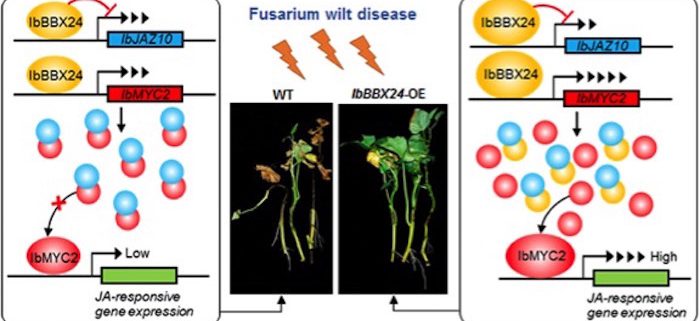IbBBX24 Enhances Fusarium Wilt Resistance in Sweet Potato
Zhang et al. identify a target gene for enhancing pathogen resistance without yield penalty in sweet potato. Plant Cell https://doi.org/10.1105/tpc.19.00641
Background: Sweet potato is an economically important root and tuber crop that is widely used as an industrial and bioenergy resource worldwide and as an important source of food for both humans and domesticated animals. However, the quality and production of sweet potato are severely threatened by Fusarium wilt disease caused by a hemibiotrophic fungus (abbreviated as Fob), which causes vascular dysfunction in over 100 plant species. Jasmonic acid (JA), a stress-related hormone in plants, plays an essential role in plant defense responses against pathogens. Various transcription factors are involved in regulating JA-responsive gene expression. B-box (BBX) proteins mediate transcriptional regulation and protein–protein interactions during multiple plant growth and developmental processes. However, whether BBX proteins function in plant defense responses remains unclear.
Question: Are BBX proteins involved in regulating Fusarium wilt resistance in sweet potato? If so, what are the underlying mechanisms?
Findings: The BBX-family transcription factor IbBBX24 regulates the JA pathway in sweet potato. When IbBBX24 was overexpressed in sweet potato, JA accumulation increased, whereas silencing this gene decreased JA levels. Overexpressing IbBBX24 significantly increased Fusarium wilt resistance, suggesting that JA responses play a crucial role in regulating Fusarium wilt resistance in sweet potato. RNA-sequencing analysis revealed that IbBBX24 modulates the expression of genes involved in the JA pathway. Furthermore, we determined that IbBBX24 modulates the JA pathway via two mechanisms. First, IbBBX24 represses the expression of IbJAZ10, encoding a JA signaling repressor, but activates the expression of IbMYC2, encoding a JA signaling activator, by binding directly to their promoters. Second, IbBBX24 physically interacts with IbJAZ10, thus releasing IbMYC2 from the IbJAZ10 repressor. Overexpressing IbBBX24 also led to increased yield in sweet potato, suggesting that IbBBX24 may serve as an ideal candidate gene for developing elite crop varieties with enhanced pathogen resistance but without yield penalty.
Next steps: In future research, the mechanisms underlying Fob infection and IbBBX24-regulated JA biosynthesis and storage root yield in sweet potato need to be investigated. Moreover, the utilization of IbBBX24 for enhancing disease resistance and yield in sweet potato could be an important task for geneticists and breeders.
Huan Zhang, Qian Zhang, Hong Zhai, Shaopei Gao, Li Yang, Zhen Wang, Yuetong Xu, Jinxi Huo, Zhitong Ren, Ning Zhao, Xiangfeng Wang, Jigang Li, Qingchang Liu, and Shaozhen He. (2020). IbBBX24 Promotes the Jasmonic Acid Pathway and Enhances Fusarium Wilt Resistance in Sweet Potato. Plant Cell DOI: https://doi.org/10.1105/tpc. 19.00641




